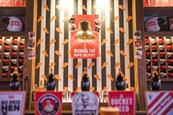
This week's Campaign podcast brings together two company founders for agencies with diversity built into their ethos and have been leading the conversation this month on how the industry can improve the way black and minority-ethnic people are treated.
Chris Kenna, founder and chief executive of Brand Advance, a media diversity network that focuses media buying towards diverse audiences, was part of a team alongside Creative Equals that called for the industry to take action in an open letter.
The letter, which collected hundreds of signatures from senior figures, included 10 actions that companies pledged, such as making racial equality a core part of their leadership team’s strategic priorities.
Kenna admitted that the letter was "not enough" and just the beginning of a process that needs to include accountability.
"I’m going to give the industry two years," he said. "In two years, my son is 18 and he could be looking to come into [the industry] and I"ll be damned if he’s going to go through what we go through in our industry right now."
Kenna questioned why this issue was still so prevalent in the industry when the pandemic crisis proved that radical change is possible. "The world stopped spinning three months ago and we all adapted over night," he explained. "There are agencies and companies that had policies of ‘we don’t work from home’ – well, now everyone does."
Shanice Mears, co-founder and head of talent at The Elephant Room, sharply criticised the letter for patronising black people and questioned whether its pledges were genuine.
She told the podcast that she wanted to share Kenna's optimism of improvement in two years, but warned that it could not happen without companies changing the way they enable minority employees to speak out when faced with discrimination.
Mears said: "We don’t feel empowered to do that. I have countless stories of people who are my friends or family – people who say they’re scared to go to HR because they might lose their job."
She later added: "I’m confident in my own skin and I know I’m in a position where people are going to back me. It’s for the young person or the people in the office who do not have that character, they’re not confident or have an innate feeling to say ‘Nah, that’s not OK.’"
That "empowerment", Mears went on, cannot come from unconscious bias training or diversity workshops, but from personal-development lessons and in-house events that encourage employees to speak out.
Kenna told his own recent story of discrimination at the hands of a current client when Brand Advance was pitching for the business: "I turned up just as moral support and jump in if anyone was struggling with a question for the client. That was it, they did all the work. I stood up to introduce them and the main guy of the client literally said: ‘Sorry, son, if you could just wait until your boss gets here and we’ll all get going together."
When challenged on whether companies in the industry were able to take radical action to improve racial equality at a time of crisis, Kenna pointed out that Brand Advance has doubled in headcount since UK lockdown measures were imposed in March. He said the business is thriving because more brands are trying to reach key workers, which over-index as BAME, and traditional agencies could have been better placed to navigate the crisis if they were more diverse.
"All we do is help brands stick [their messaging] in front of the forgotten ones, the outsiders – put them all together and you’ve got a reach of a billion people on your network," Kenna said. "But we’re just doing the same job as their agencies would have been doing… but the reason Covid has hit black and Asian [people] so hard is because they over-index in that ‘key worker’ category. You wouldn’t need to lay off half the people if you’d just done this before."
Mears went further, warning that a new generation of industry professionals will replace agencies that fail to adapt. "People are tired… They’re just going to come in and these big agencies and these big clients who have been in the industry for 40 or 50 years are going to get wiped out, because the younger generation are going to say: ‘We don’t need you, we’ll create our own stuff, we’ll create our own agencies, we’ll create our new brands.'"





copy.jpg)